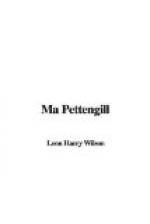He was quite wordy about the lady to me when he come over on an errand one day. He told me all about these delightful talks of theirs, and what an attractive person she was, sound as a nut, and companionable and good-looking without being one of these painted dolls. He said, to see her above her sewing, she was a lovely view that he never tired of gazing at, and to hear her loathe children was music to the ear. He said she was a rare woman. I said she must be and asked him if he had committed himself.
“Well, I don’t say I have and I don’t say I haven’t,” he says; “but here I be, standing with reluctant feet at the parting of the ways. And who knows what might happen? I know I’ve had some darned close shaves from doing a whole lot worse in my time.”
So I wished him the best of luck with this lady child hater; not that I thought he’d really get what was coming to him. He was so crafty. He was one of them that love not well but too wisely, as the saying is. Still, there was a chance. He was scared to death of fire and yet he would keep on playing with it. Some day the merry old flames might lick him up. I hoped for the best.
A few days after that I went down to the foreman’s house late in the afternoon to see him about a shipment we had to make. Scott was off somewhere, but his sister was in; so I set talking with her, and waiting. This here Minna Humphrey was a hectic, blighted girl of thirty, sandy-haired, green-eyed, and little—no bigger than a bar of soap after a day’s washing. What had blighted the poor thing was having to teach public school for a dozen years. She’d been teaching down to Kulanche that year and had just closed up. We set out in front of the house and Minna told me she was all in; and how she’d ever got through the season she didn’t know.
She went on to speak of little children. Fire in her voice? Murder! According to Minna, children had ought to be put in cages soon as they can walk and kept there till they are grown; fed through the bars and shot down if they break out. That’s what twelve years’ enforced contact with ’em had done to Minna’s finer instincts. She said absolutely nothing in the world could be so repugnant to her as a roomful of the little animals writing on slates with squeaky pencils. She said other things about ’em that done her no credit.
And while I listened painfully who should be riding up but Homer Gale!
“Here,” I says to Minna; “here’s a man you’ll be a joyous treat to; just let him come in and listen to your song a while. Begin at the beginning and say it all slow, and let Homer have some happy moments.”
So I introduced the two, and after a few formalities was got over I had Minna telling in a heartfelt manner what teaching a public school was like, and what a tortured life she led among creatures that should never be treated as human. Homer listened with glistening eyes that got quite moist at the last. Minna went on to say that children’s mothers was almost as bad, raging in to pick a fuss with her every time a child had been disciplined for some piece of deviltry. She said mothers give her pretty near as much trouble as the kids themselves.




